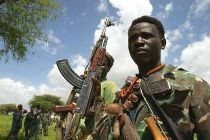Fighting in Darfur despite ceasefire – U.N. says
KHARTOUM, Sept 1 (Reuters) – Despite a ceasefire, Sudanese forces and rebels are fighting in Western Darfur, closing roads to aid workers and disrupting supplies to more than one million displaced people, a weekly U.N. briefing said on Wednesday.
 At the United Nations in New York, U.N. Secretary-General Kofi Annan said on Wednesday in a report to the Security Council that the Sudanese government had made some progress in reining in Arab Janjaweed militias but had failed to fully protect African villagers.
At the United Nations in New York, U.N. Secretary-General Kofi Annan said on Wednesday in a report to the Security Council that the Sudanese government had made some progress in reining in Arab Janjaweed militias but had failed to fully protect African villagers.
Annan said a much larger international force in Darfur, as called for by the African Union, was required “as quickly as possible” to decrease violence and better protect civilians.
In a July 30 Security Council resolution, Sudan was given 30 days to show progress in securing Darfur, disarming militias and allowing more aid access, or face possible sanctions. Jan Pronk, the top U.N. envoy in Sudan, delivers his report on Thursday.
In its weekly briefing, the United Nations chronicled a number of reported ceasefire violations, including an attack on a village, the rape of a seven-year-old girl and roads closed to relief workers and medical supplies in recent weeks.
After years of low-level conflict between Arab nomads and African farmers over scarce resources, rebels launched a revolt in Darfur last year, accusing Khartoum of arming Arab militias known as Janjaweed, to loot and burn African villages.
Sudan denies links to the Janjaweed and calls them outlaws.
The United Nations has called Darfur one of the world’s worst humanitarian crises, with more than one million displaced and 200,000 refugees encamped in neighbouring Chad.
Peace talks in Abuja have been bogged down as both sides accuse the other of violating an April ceasefire. African Union ceasefire monitors on Monday confirmed rebel reports that the government had attacked civilians last week.
OIL REVENUES
In Abuja, Darfur rebels asked Sudan on Wednesday to use its oil revenues to help alleviate humanitarian needs in their region, delaying agreements on how to solve the crisis there.
Rebels say they are almost ready to accept an African Union humanitarian proposal relating to access to humanitarian aid, protection of civilians, and a joint humanitarian monitoring unit for Darfur.
But the demand Sudan use revenues from its roughly 320,000 barrels a day oil output to pay aid bills is new and likely to delay further progress until debated first, observers say.
Ahmed Mohammed Tugod, negotiator for the Justice and Equality Movement (JEM) rebels, said during a recess at talks in the Nigerian capital Abuja that his group had asked the Sudanese government to allocate “a sizeable percentage of oil revenues” to support the humanitarian effort in Darfur.
“This is a very important point because the international community cannot cope with the situation. The Sudanese government has a lot of money to pay but they don’t want to pay,” he added.
Up to 50,000 people have died since the conflict began 18 months ago and more than a million Darfuris have fled their homes for fear of attacks by the Janjaweed.
